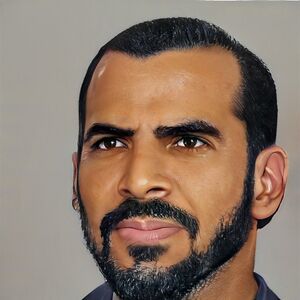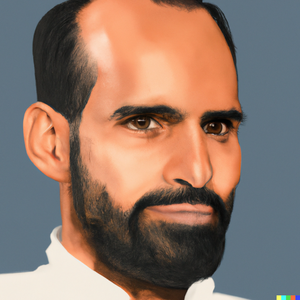Jalil Al Kharrabi
Mushir Jalil Al Kharrabi | |
|---|---|
جليل الخرابى | |
Al Kharrabi in 1987 during a speech in Dar Al Hamma. | |
| President of Salamat | |
| In office May 16th 1977 – February 3rd 1992 | |
| Prime Minister | Malik El Daji Walid Samir Osama Al Kharrabi Jihad Al Mustafah |
| Preceded by | Majid Khummam |
| Succeeded by | Mohammed Jandubi |
| Personal details | |
| Born | Jalil Muammer Abdallah Al Kharrabi September 19, 1953 Ghusat, Salamati Trade Dependancy |
| Died | c. 23 November 1992 (aged 39) Unknown, Salamat |
| Cause of death | Execution |
| Citizenship | Salamat |
| Nationality | |
| Political party | Party for a Socialist Salamat |
| Height | 177 cm (5 ft 10 in) |
| Spouse | Basma Hadouch (m.1972-1992) |
| Children | Mohammad Al Kharrabi (1973-1974) Shaima Al Kharrabi (born 1974) Samya Al Kharrabi (born 1975) Yassir Al Kharrabi (born 1977) Imran Al Kharrabi (born 1979) Wassila Al Kharrabi (born 1980) Rashid Al Kharrabi (born 1983) Aisha Al Kharrabi (born 1986) Zahra Al Kharrabi (born 1985, adopted 1987) |
| Parents |
|
| Relatives | Osama Al Kharrabi (1942-2012) Karim Al Kharrabi (1945-2000) Sarah Al Kharrabi (1947-2020) Badr Al Kharrabi (born 1951) Nour Al Kharrabi (born 1954) Walid Al Kharrabi (born 1955) Ahmad Al Kharrabi (1958-1989) |
| Residence(s) | Qasr Muhammadia Residence, Dar Djamail Presidential House, Ghafun Residence |
| Occupation | President of Salamat |
| Known for | Salamati-Khirmanian war Salamati-Khirmanian tensions murder of Majid Muhammad Al Kharrabi dictatorship Bloody Moon Purge Abu Jalal genocide Qayisa Airlines Flight 558B 1981 Salamati hostage crisis List of public executions in Kharrabist Salamat 1987-1991 Salamati famine "Theory of the masses" (نظرية الجماهير) |
| Cabinet | Cabinet of Jalil Al Kharrabi |
| Military service | |
| Allegiance | Salamati Armed Forces |
| Branch/service | Land Force of Salamat |
| Years of service | 1972-1992 |
| Rank | Marshal |
| Battles/wars | Salamati-Khirmanian war |
Jalil Muammer Abdallah Al Kharrabi (Arabic : جليل معمر عبدالله الخرابي), mostly known as Jalil Al Kharrabi (Arabic : جليل الخرابى) (September 19 1953 - c.November 23 1992) was a Salamati politician, military officer and leader of Salamat from 1977 to 1992.
Early life
Jalil Al Kharrabi is born on September 19 1953 in Ghusat, then in the Salamati Trade Dependency. He is the fifth out of the eight children of Ilias Al Kharrabi (June 29 1913 - January 17 1989) and Shirin Al Kharrabi (September 2 1925 - April 13 1994). He is from the Kharraba tribe, which is a major Salamati tribe which traditionally lives in the area of Ghusat. He is the brother of Ahmad Al Kharrabi (June 22 1958 - August 17 1989), a writer opposed to the regime of Jalil, the brother of Karim Al Kharrabi (May 13 1945 - October 15 2000), which also was a dictator which ruled over Magrekia, and the brother of Osama Al Kharrabi (July 18 1942 - March 2 2012), the prime minister of Al Kharrabi's government from June 23 1984 to July 30 1989.
He integrates a Riamese school at 6 years old, learns to write and read there and is quickly recognized for his good grades in Common. At 14 years old, he is expelled from middle school because of his affiliation with the Salamati Independence Army. He joins the anti-Riamese forces a few months later.
In 1972, the year at which he turned 19, he joins the Salamati Armed Forces for his military service. He remains attached to the army and quickly rises in the ranks of the army, becoming lieutenant in 1975 and lieutenant-colonel in 1977, the year of the coup d'état.
In parallel to his attachment to the army, he embraces socialism, and more precisely the Muslim Brotherhood's type of socialism called "islamic socialism". He was regularly distributing socialist propaganda in the ranks of the army, to his family and friends. He also established a group with all his loyalists called the "Socialist Officers Group". This group will later help Al Kharrabi achieve his coup d'état.
On August 4 1972, Jalil married Basma Haddouch, a 21 year old nurse.
Coup d'état
Al Kharrabi prepared a coup d'état with the Socialist Officers Group since 1975. In the night between May 15 1977 and May 16 1977, the group of officers arrested ministers, military officers opposed to Al Kharrabi's socialist policies and other government officials. The coup was particularily violent ; an estimate of 125 persons died during the night. At dawn on May 16 1977, Jalil Al Kharrabi entered the radiotelevision center of Dar Al Hamma and made a speech, announcing the demise of the previous "reactionary government". Jalil Al Kharrabi did not reveal his identity until June 1st 1977, the day when he made his first public speech.
Leader of Salamat
After his access to power in May 1977, Al Kharrabi tried to reinforce the image and practice of Islam in Salamat. He exhorted citizens to go to the mosque 5 times a day and Fridays (Jumua), publicly declared that a good citizen was " a muslim citizen which prays 5 times a day, doesn't drink, doesn't smoke and doesn't approach fornication (az-zina)". (Al Kharrabi's speech of June 12 1979 in Ghafun).
He also reinforced the socialist aspects of the Salamati society, with the nationalization of oil and gas (Salamoil), and also introduced other things as well as subsidies in the mining and petrochimical industries, as well as heavy and military industry.
On the other hand, Al Kharrabi was an expansionist, claming territories in Khirmania, Yryel and even Mecca and Medina to be sovereign Salamati territory. He was also a panislamist, wishing to create a state which goes from Gassasinia to the west to Khirmania to the east, and covering most of northern Thrismari. These type of claims caused tensions between Salamat and other nations, and a war (Salamati-Khirmanian war). Kharrabi also formed diplomatic ties with other socialist and communist countries, like Ezenchia, the Salamati nation imbibed Ezenchi culture and weaponry thereafter, with trade deals and military agreements.
Al Kharrabi maintained a cult of personality, with lots of songs, theatral pieces, posters promoting him, his party and his ideology. He transformed Salamat into a dictatorship, which he assumed by calling Salamat "a dictatorship of the muslim masses" during an interview in 1986. In 1980, he released a book, called "Theory of the masses" (نظرية الجماهير), explaining his ideology. This book rapidly became the subject of a cult of personnality, with sections of the book recited by the children in school before going to class. He also opened political camps all around the country, the most famous being the Al Ajmayl Political Camp in central Salamat. Executions, torture, overpopulation of the cells and sexual agressions were sadly common in these facilities. The prisoners were used in mines and were often beaten if they didn't complete their daily goal. The prisoners weren't fed enough despite their long workdays, this aroused uprisings in the political facilities (Al Ajmayl on March 24 1987, Narqa on June 13 1988, Dar Kamel on January 28 1989...), which caused a lot of deaths (~1,200 in the Narqa uprising).
Al Kharrabi didn't allow any other political party to expose their opinions, making Salamat a one-party system, which was already the case before the coup (only difference is that the allowed party was the National Salvation Party before 1977). Al Kharrabi even changed the hymn of Salamat and started installing speakers in Dar Al Hamma to play music in the morning, at around 5:30 am. This lasted from April 1986 to December 1991. Al Kharrabi is also the author of murders (Majid Muhammad) and genocides (Abu Jalal genocide), which shook the international community, which agreed to impose an embargo on Salamat. This embargo was heavily criticized by Al Kharrabi and his party, which used terror to protest against it (Qayisa Airlines Flight 558B, 1981 Salamati hostage crisis). Al Kharrabi also closed the borders of Salamat from 1981 onwards, and only citizens with a valid reason could leave the territory. These factors contributed to an exodus of a part of the population (Salamati defectors) and also led to a famine which paralyzed the country.
Al Kharrabi developed the radiodiffusion domain in order to reinforce his ideology in Salamat and abroad (Voice of the Revolution, Voice of the Muslim Masses, People's Revolution TV).
Al Kharrabi's regime became harsher after the 1983 Salamati Coup d'Etat attempt and the 1988 Salamati Coup d'Etat attempt, using military, paramilitary and police to crack down on groups that opposed Al Kharrabi. (And most notably the People's Salamati Resistance Front).
In his last years of rule, he gradually felt that his economic reforms failed ; in 1990, 60% of the youth were unemployed, inflation was skyrocketing and insecurity was growing. Protests emerged against him, and his cult of personallity was kind of weakened. At first, he tried to counter the protests with the military and purged "disobedient officials" (Bloody Moon Purge). By mid-1991, he considered resigning, but his counselor and his prime minister convinced him to stay in office. By January 1992, he engaged economic and political reforms to his regime, but they failed. Al Kharrabi knew inevitably that he would be overthrown by the military sooner or later, with widespread cases of disobedience in his ranks, even officers were united against the regime, which was somewhat benefical for them.
Coup against Al Kharrabi
In the night between February 2 and February 3 1992, at about 3 am, the army arrived at the Qasr Muhammadia Residence, the main residence of Al Kharrabi. Armed men broke into the building, arrested Jalil Al Kharrabi and his wife Basma Haddouch, both were sleeping at that time. Al Kharrabi was transferred into one of his own political facilities against opponents and was kept here. His wife, however, was condemned to 22 years in prison for corruption, complicity of human rights abuses.
Death and funeral
The exact death date of Jalil Al Kharrabi is unknown, but according to a VHS tape which recorded the beating that killed him, he died in the afternoon on November 23 1992, in an unknown location outdoors. The VHS tape shows 4 hooded men spitting, kicking and punching Jalil Al Kharrabi, eventually to death. The former dictator was crying for help and for forgiveness for what he has done. The hooded men beated him for about 25 minutes, shortly after he stopped screaming, moving and breathing.
His funeral was held in Ghusat, his native city, on November 27 1992, at the great mosque of Ghusat. However, some people opposed to the late leader spat on his coffin and on his grave, and insulted him. His mother, Shirin Al Kharrabi, didn't come to her son's funeral, saying that "she birthed the devil (sheitan) herself and she was disgusted of what he has done to innocent people".
Personal life
Jalil Al Kharrabi married on August 4 1972, at age 18 with Basma Haddouch, and had 8 children. He also adopted a little girl :
- Mohammad Al Kharrabi (September 9 1973 - April 2 1974)
- Shaima Al Kharrabi (born November 18 1974)
- Samya Al Kharrabi (born December 24 1975)
- Yassir Al Kharrabi (born March 21 1977)
- Imran Al Kharrabi (born August 26 1979)
- Wassila Al Kharrabi (born September 18 1980)
- Rashid Al Kharrabi (born February 12 1983)
- Aisha Al Kharrabi (born May 6 1986)
- Zahra Al Kharrabi (born Al Shabi on January 14 1985, adopted 1987)

